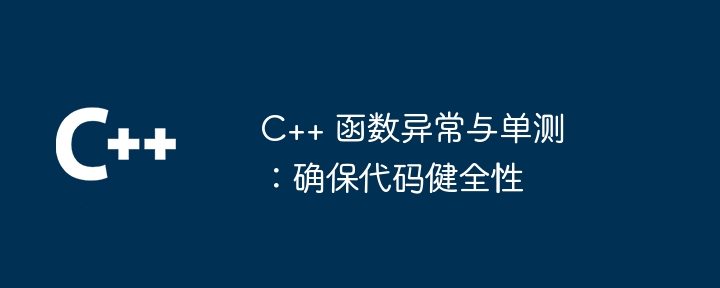
Exception handling and unit testing are important practices to ensure the soundness of C code. Exceptions are handled through try-catch blocks, and code jumps to the catch block when an exception is thrown. Unit testing isolates code testing to verify that exception handling works as expected under different circumstances. Practical case: The sumArray function calculates the sum of array elements and throws an exception to handle an empty input array. Unit tests verify the expected behavior of a function under abnormal circumstances, such as throwing a std::invalid_argument exception when an array is empty. Conclusion: By leveraging exception handling and unit testing, we can handle exceptions, prevent code from crashing, and ensure that the code behaves as expected under abnormal conditions.

C function exceptions and single testing: ensuring code soundness
Preface
In C, exceptions are special events that can be used to report errors or abnormal conditions at runtime. Single testing is an important practice to verify the correctness of the code. This article explores how to use exceptions and unit tests to ensure the sanity of your C code.
Exception handling
Exceptions in C are handled through try-catch blocks.
try {
// 可能会引发异常的代码
} catch (const std::exception& e) {
// 异常处理代码
}In the try block, if any code throws an exception, the program will jump to the corresponding catch block.
Unit testing
A unit test is an isolated code test that verifies that a specific feature works as expected. For exception handling, single tests can be used to ensure that a function behaves in the desired manner under abnormal conditions.
TEST(ExceptionTest, TestThrow) {
MyClass obj;
EXPECT_THROW(obj.doSomethingThatThrows(), std::exception);
}This test asserts that the MyClass::doSomethingThatThrows() function will throw a std::exception.
Practical case
Requirements: Calculate the sum of elements in the array, and throw an exception if the input array is empty.
int sumArray(const int* array, size_t size) {
if (size == 0) {
throw std::invalid_argument("数组为空");
}
// 计算数组元素的总和
int sum = 0;
for (size_t i = 0; i < size; ++i) {
sum += array[i];
}
return sum;
}Unit test:
TEST(SumArrayTest, TestEmptyArray) {
int array[] = {};
EXPECT_THROW(sumArray(array, 0), std::invalid_argument);
}This test verifies that when the input array is empty, the sumArray function throws std:: invalid_argument Exception.
Conclusion
By leveraging C’s exception handling and unit testing framework, we can ensure the soundness of our code, handle exceptions, and prevent application crashes. Exception handling allows us to report errors and recover to a known good state, while unit testing can verify that the code behaves correctly under these circumstances.
The above is the detailed content of C++ function exceptions and single testing: ensuring code soundness. For more information, please follow other related articles on the PHP Chinese website!
 What are the differences between c++ and c language
What are the differences between c++ and c language
 Recommended learning order for c++ and python
Recommended learning order for c++ and python
 Cost-effectiveness analysis of learning python and c++
Cost-effectiveness analysis of learning python and c++
 Is c language the same as c++?
Is c language the same as c++?
 Which is better to learn first, c language or c++?
Which is better to learn first, c language or c++?
 The difference and connection between c language and c++
The difference and connection between c language and c++
 C++ software Chinese change tutorial
C++ software Chinese change tutorial
 Cost-effectiveness analysis of learning python, java and c++
Cost-effectiveness analysis of learning python, java and c++




